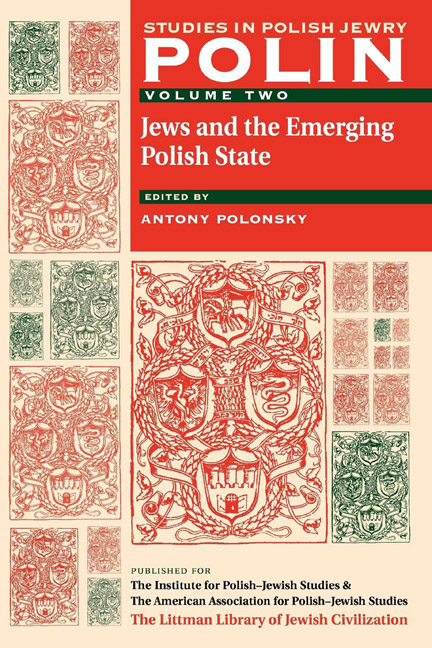Book contents
- Frontmatter
- Dedication
- Editors and Advisers
- Contents
- Polin: Studies in Polish Jewry
- Polin
- Statement From the Editors
- SYMPOSIUM: JEWS AND THE EMERGENCE OF AN INDEPENDENT POLISH STATE
- ARTICLES
- DOCUMENTS
- COMMENTARY
- REVIEW ESSAYS
- Images of Jewish Poland in the Post-war Polish Cinema
- The Holocaust -Jews and Gentiles. In Memory of the Jews of Pacanów
- Jews as a Polish Problem
- BOOK REVIEWS
- Leiter to the Editors
- Contributors
- Obituaries
Jews as a Polish Problem
from REVIEW ESSAYS
- Frontmatter
- Dedication
- Editors and Advisers
- Contents
- Polin: Studies in Polish Jewry
- Polin
- Statement From the Editors
- SYMPOSIUM: JEWS AND THE EMERGENCE OF AN INDEPENDENT POLISH STATE
- ARTICLES
- DOCUMENTS
- COMMENTARY
- REVIEW ESSAYS
- Images of Jewish Poland in the Post-war Polish Cinema
- The Holocaust -Jews and Gentiles. In Memory of the Jews of Pacanów
- Jews as a Polish Problem
- BOOK REVIEWS
- Leiter to the Editors
- Contributors
- Obituaries
Summary
ANEKS* is a Polish political quarterly published in London. In 1986 a double issue appeared, devoted largely to Polish -Jewish relations. Seven articles, 130 pages in total, were published in a section entitled ‘Jews as a Polish Problem’. This followed in the footsteps of two Catholic monthlies from Poland, which published special issues on Jewish history and Jews in Poland (WIĘZ.(, April 1983 and (ZNAK, February -March 1983). The latter (407 pages long) was reviewed in the first volume of POLIN.
Articles in this issue of ANEKS deal mainly with the Holocaust, although the period after the war is also discussed and the questions raised are not only historical, but also moral and philosophical. In almost all Claude Lanzman's film Shoah is discussed or at least mentioned. The character of the papers varies. Jakub Karpiński's ‘Asymmetry’ and Wlodzimierz Goldkom's ‘The Sense of History and the Destruction of Jews’ are historico-philosophical. Jacek Kuroń presents his personal memoirs in ‘Zośka'; Timothy Garton Ash and Israel Shahak put forward two different approaches to the film Shoah. Jan Tomasz Gross reconstructs Polish-Jewish relations during the war, which are also among the issues discussed in Aleksander Smolar's historical and political essay.
Smolar in his ‘Taboo and Innocence’ offers in many ways the boldest and most interesting analysis of Polish-Jewish relations during and after the war. He stresses that the core of the issue is a moral problem - the attitudes of Poles towards the Jews - which, given Polish powerlessness, could have had little practical consequence for the fate of the Jews. Smolar disagrees with both typical Jewish and Polish historical treatments of this issue. He rejects the view that Polish attitudes during the war constituted a continuum with pre-war anti-semitism. Equally, he questions the claims that the tragic experiences of the war changed completely Polish attitudes. Polish-Jewish relations during and after the war were immensely complex and often peculiar and absurd. It is an irony of history that in Poland there were anti-semites who helped the Jews during the war, but did not like them either before or after. Polish anti-semites have not disappeared, because unlike the situation in other European countries there was no crisis of right-wing ideology.
- Type
- Chapter
- Information
- Jews and the Emerging Polish State (Polin Volume Two) , pp. 391 - 403Publisher: Liverpool University PressPrint publication year: 2008



